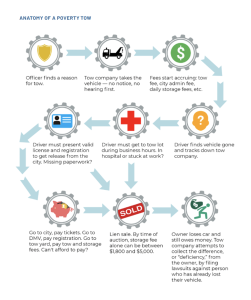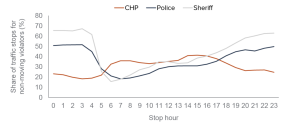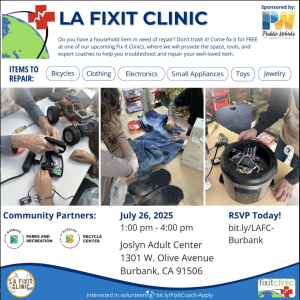Okay so here’s the idea — we’re going to take the idea of a tool lending library a step further. I promise I’ll get to the point ASAP but here’s a little preamble: a lot of people must know about tool lending libraries at this point, they’re absolutely fantastic and they make a lot of sense (Hamilton, 2021). If I have a DIY project around the house, do I want to go out to Home Depot and drop a few hundred dollars on a tool I may or may not ever use again? No. Maybe you have a family member, neighbor, or friend that might have the equipment or the know-how to help, but then again, maybe you don’t, or maybe they don’t have the exact thing you need. This is where tool lending libraries come in: you check the tool out, you use it, you bring it back, saving money on buying or renting a tool, and probably on the cost of hiring a contractor.
I’ve been thinking a lot about tool lending libraries and what other context they might be really impactful in as a library service. The other day I was procrastinating, on YouTube, and I stumbled upon a really great video about one of the all-time great radio shows: Car Talk.
In this video YouTuber Angela Collier does a fantastic job of explaining how Car Talk is actually a science podcast wherein the hosts, brothers Tom and Ray Magliozzi address people’s car troubles with an investigative/scientific-method process — if you have the time I highly recommend a watch.
So what on earth does this have to do with libraries you might be asking at this point? Well, on a base level, the idea of providing information, expertise, and problem-solving to the issue of car repair, an infamously difficult realm of knowledge to master, serves a dire information need. Something else in the video really stood out to me — apparently one of Tom and Ray’s early ventures in the car repair space after graduating at MIT was creating a do-it-yourself auto repair shop called Hacker’s Haven. People could bring in their cars, use space and tools, as well as bounce ideas off Tom and Ray.
This got me thinking: what if we did that at a library?
The LAPL already has some resources available to users in this vein, making the Chilton Library available for free to all cardholders. The Chilton Library provides detailed technical information about many different makes and models of cars, and is searchable online. It even includes photographs, step-by-step guides, and detailed videos. Connecting users with professionals, alongside the Chilton Library, seems a natural extension of the library’s existing services. Other community-oriented spaces like the Pasadena Repair Cafe or the LA Fix-it Clinic already provide similar services, hosting repair days for small electronics, clothes, etc., and could also be partnered with.
In a city like Los Angeles, where everyone “has to drive” (they don’t, but that’s a different conversation) this seems like an absolute no-brainer. Hosted either in library parking lots or off-site on other municipal or county property, librarians could help connect users with car problem with a team of volunteer mechanics comprised of retirees, trade school students, amateur-experts, etc. and also help answer other inquiries about car repair in general. Donated parts and donated tools would help defray the cost of the program. Probably most of the issues would be simple, check-engine light, air filters, oil and other fluid changes, brake pads, the basic but absolute essentials of car maintenance.
So why should the public library provide this service? Well, aside from it being part of an information need for life mastery, whether or not one’s car works can make an absolutely life-changing difference in one’s employment and economic security. One study found that “owning a vehicle often doubles the probability of employment and the number of hours worked, increasing the probability of employment by roughly 30% points and work hours by about 13 per week” (Baum, 2009, p. 160). Not to mention the fact that car repairs and even routine maintenance are costly, and reduce the positive effect on economic mobility that car ownership can have. Fix-it tickets, failed inspections, impounds: all of these things might be a minor inconvenience, or a moment of absolute economic precarity, depending on one’s income-level

(Note: Anatomy of a Poverty Tow shows the cycle of economic impacts from vehicle impound. Reproduced fromTowed into debt: How towing practices in California punish poor people by Western Center on Law & Poverty. (2019).
Another reason, is community safety. I’m not talking about your being safer, although that’s good too. If people’s cars are in good repair, there’s probably less-likelihood of a police-interaction, which as we know all too well, can routinely result in other legal consequences, incarceration, or even death (Harris, 1999).
 (Note: this chart indicates that half or more of all night time traffic stops are for non-moving violations, i.e. related to vehicle equipment issues. Reproduced from Racial Disparities in Traffic Stops, Public Policy Institute of California (2022).)
(Note: this chart indicates that half or more of all night time traffic stops are for non-moving violations, i.e. related to vehicle equipment issues. Reproduced from Racial Disparities in Traffic Stops, Public Policy Institute of California (2022).)
Really this service can reach anyone who has an information need about their car, wants to learn more about car repair, maybe wants to get their hands dirty and change their own oil for the first time, but above everything it’s about providing our community members who are in the most need with a little more support, materially, economically, and in terms of their safety.
Obviously there are some safety concerns to take in to account. We can’t just have library users sliding under cars on jacks and swinging socket wrenches around. Everything would need to be more or less monitored by select volunteers who would check-in on each project and enforce safety measures. Similarly volunteers would need to direct cars into designated areas and ensure a safe and effective flow of users and their vehicles. An additional concern would be the safety of the cars following the repair clinic, and any resultant liability for the library and its volunteers. This matter would need to be investigated and considered, but participants could also sign a waiver of liability in exchange for services. Volunteer mechanics with certifications would need to vet other volunteers for qualifications and safety.
As far as a timeline, organizing this event and service could take a long time. Between soliciting and vetting volunteers, securing space and materials, and figuring out all the logistics, it’s possible this could take several months.
Within our organization, we would try and stress the importance of connecting with our community of users, and view this as an opportunity to not only provide material support, but also introduce them to other aspects of the library. Library staff could help pull relevant materials and even design lib-guides around automotive history, or cars in fiction. There are many different ways for staff for engage with this service. Additionally, we would need to train and prepare staff for this even with regular meetings updating them leading up to the event, soliciting ideas and help as we go along.
As far as the community, posting notices in library spaces would definitely be helpful for marketing purposes, but a well-directed social media campaign, perhaps partnering with other local repair-clinic/fix-it organizations would probably be our best form of outreach. Additionally, repair shops might refer clientele that are having trouble affording repairs to the library’s automotive fix-it clinic day.

(Note: This example of community-organized LA Fixit Clinic’s social media marketing post from Instagram serves as a excellent example of how to advertise this service. Reproduced from LA FIX-IT Clinic Instagram Page https://www.instagram.com/lafixitclinic/?hl=en)
Expansion – I envision this service starting off as a an annual or bi-annual event, with the library attempting to accommodate as many people as possible in a truly large-scale event. Ideally, given enough interest, we would move to providing this service once every three months, or popping-up in different locations throughout the city. Finally, it would be incredible to have a permanently staffed or on-call repair clinic, were there to be enough sustained interest.
References
Baum, C. L. (2009). The effects of vehicle ownership on employment. Journal of Urban Economics, 66(3), 151–163. https://doi.org/10.1016/j.jue.2009.06.003
Hamilton, S. (2021). What’s mine is yours: The history of U.S. tool-lending libraries. School of Information Research Journal 11(1). https://doi.org/10.31979/2575-2499.110104
Harris, D.A. (1999) Driving while black: Racial profiling on our nation’s highways. ACLU. https://www.aclu.org/publications/driving-while-black-racial-profiling-our-nations-highways
Los Angeles Public Library. (n.d.) Chilton Library. Los Angeles Public Library. lapl.org/chilton
Public Policy Institute of California. (2022) Racial disparities in traffic Stops. https://www.ppic.org/publication/racial-disparities-in-traffic-stops/
Western Center on Law & Poverty. (2019). Towed into debt: How towing practices in California punish poor people. https://wclp.org/wp-content/uploads/2019/03/TowedIntoDebt.Report.pdf
History of Hacker’s Haven: https://makezine.com/article/workshop/hackers-haven-of-tom-magliozzi/
Car Talk YouTube Video: https://www.youtube.com/watch?v=J82N4F4jlDI&t=1679s&ab_channel=AngelaCollier
LA Fix-it Clinic: https://www.instagram.com/lafixitclinic/?hl=en
Pasadena Repair Cafe: https://repair-cafe-pasadena.mailerpage.io/